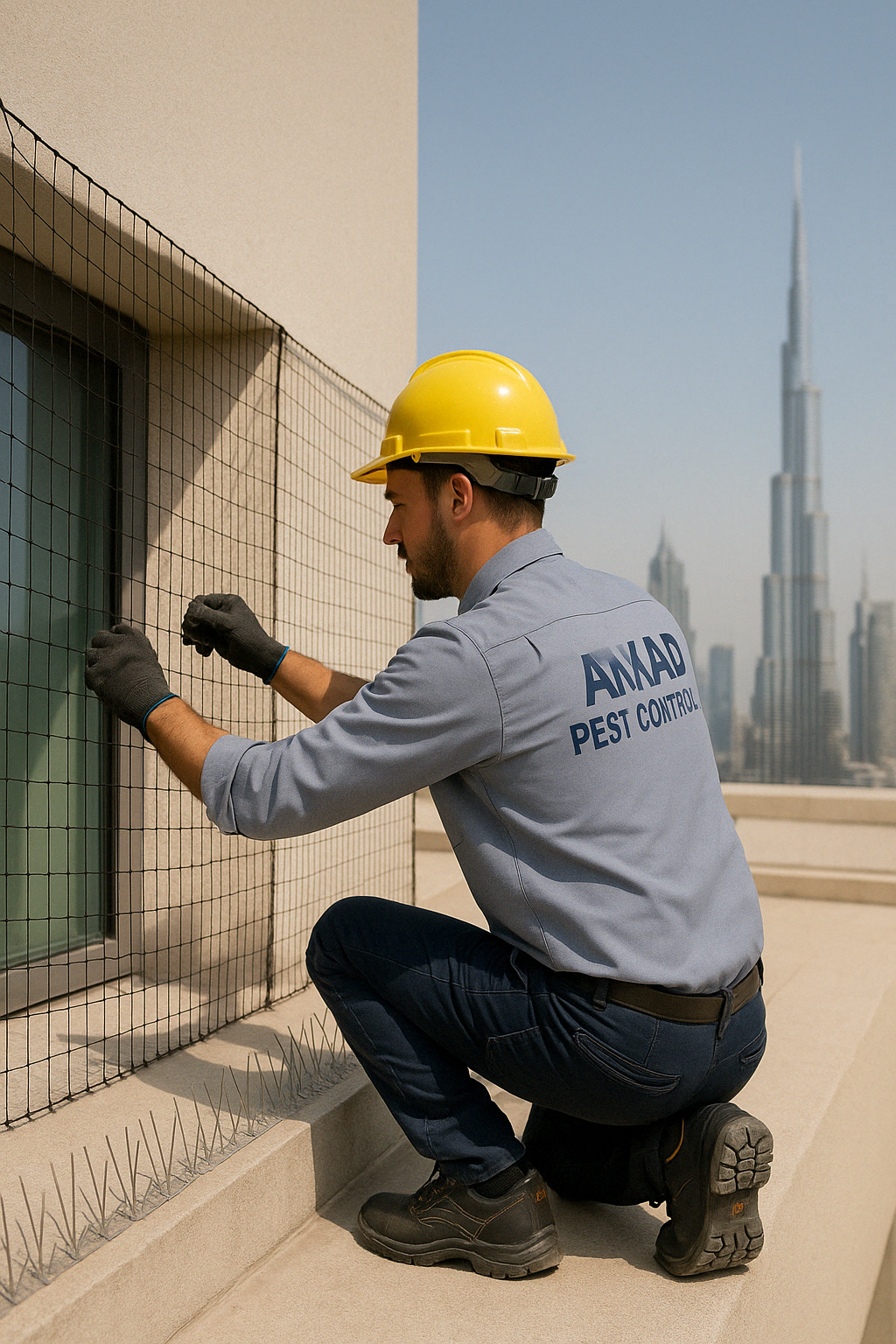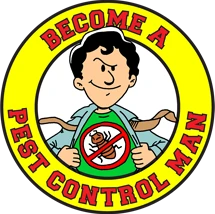Call Now for Fast Bird Control Service in Dubai — 044251557
Birds Control and Prevention
Bird Control Dubai
In a bustling city like Dubai, where high-rise buildings, villas, warehouses, and luxury apartments dominate the skyline, bird problems—especially from pigeons and crows—can quickly become a serious concern. Whether it's droppings staining your villa’s facade, nesting in AC units, or hygiene violations for restaurants and hotels, birds can impact both health and property.
Akkad Pest Control offers expert bird control services in Dubai, combining humane practices with high-grade deterrents such as stainless-steel spikes, bird netting, bird gels, and sound-based repellents. We handle all types of properties, ensuring long-term bird prevention while maintaining aesthetic standards.

Fast Bird Control Estimation in Dubai
Time is money—especially when your property is being affected by birds. Whether you're a homeowner, facility manager, or business owner, we understand how important it is to get quick service and accurate quotes. At Akkad Pest Control, we offer same-day site assessments, real-time online consultation, and free cost estimations within 30 minutes. Just share your photos or location and our team will evaluate the best treatment plan tailored to your needs.
Click here to request your bird control inspection in Dubai and let our professionals handle the rest.
Why People in Dubai Choose Akkad Pest Control for Bird Control
Akkad Pest Control is trusted by thousands of residential and commercial clients in Dubai for a reason. With over a decade of experience, our trained team uses government-approved products, offers warranty-backed services, and operates with full transparency. We serve areas across the entire city including Business Bay, JVC, Marina, Deira, and Arabian Ranches.
- Provide same-day response and rapid job completion
- Use non-toxic, pet-safe bird repellent materials
- Install bird netting and spikes without damaging the building's design
- Offer post-service cleaning and follow-up visits
Bird Control for Villas and Apartments in Dubai
Birds nesting on balconies, roof edges, and air-conditioning units can become a daily nuisance for villa and apartment residents. Aside from the mess caused by droppings, their presence can block vents, create foul odors, and even pose health hazards due to airborne pathogens.
- Balcony netting that doesn’t block your view
- Anti-roosting spikes on rooftops, solar panels, and fences
- Low-maintenance, weather-resistant bird repellent gels
- Custom solutions for townhouses, duplexes, and high-rises
We have protected hundreds of homes in areas like Palm Jumeirah, Emirates Hills, Al Barari, and Mirdif. Our team arrives on time, works quietly, and ensures your home is bird-free without disrupting your daily life.
Commercial Bird Control Services in Dubai
If you're running a restaurant, warehouse, shopping mall, or hotel, bird infestation isn't just an annoyance—it’s a violation of hygiene codes and a potential PR disaster. Accumulated droppings can corrode building material, trigger fire hazards by clogging vents, and contaminate food storage areas.
- Bird net installation for large warehouse ceilings
- Discreet bird control for restaurants and cafés with outdoor seating
- Rope-access netting and spikes for tall commercial towers
- Sanitization of previously infested areas
We've served clients in locations like Dubai Marina, Al Quoz Industrial Area, DIP, and Downtown Dubai. Our services comply with Dubai Municipality pest control regulations.
Understanding the Bird Problem in Dubai
While birds add charm to nature, in urban environments like Dubai they can quickly become a serious nuisance. Pigeons, sparrows, and crows often find shelter in building crevices, rooftops, balconies, and AC units. Their droppings not only stain buildings but also carry harmful bacteria and fungi. Nesting materials can block ventilation systems, posing safety and fire risks.
In agricultural settings and outdoor food businesses, birds can contaminate food and water sources, disrupt operations, and lead to hygiene complaints. Their constant presence becomes a risk to both health and business reputation.
Why Bird Pest Control is Important
Controlling bird populations is essential to protect property, health, and business operations. Ignoring the issue can lead to long-term structural damage, fines, and customer dissatisfaction.
- Property Protection: Bird droppings are acidic and can corrode building surfaces, air conditioning units, and solar panels.
- Health & Safety: Birds transmit diseases such as salmonella, histoplasmosis, and avian flu through droppings and nesting materials.
- Operational Disruption: In commercial sites, bird infestation can drive away customers and lead to health inspection violations.
- Noise Pollution: Constant chirping and flapping can cause disturbance in residential and business areas.
Effective Bird Control Methods Used in Dubai
At Akkad Pest Control, we use a mix of humane, eco-safe, and proven techniques to eliminate and prevent bird infestations. Every method is chosen based on your property type, location, and the extent of the problem.
- Bird Spikes: Prevent birds from landing and roosting on ledges, fences, signs, and rooftops.
- Bird Netting: A long-term and discreet solution to block access to balconies, ceilings, AC areas, and warehouses.
- Bird Gel & Repellents: Non-toxic gel applied to flat surfaces creates a sticky layer that deters birds without harm.
- Sound Devices: High-frequency or predator-sound devices used to drive birds away from commercial spaces.
- Habitat Modification: We remove nests, seal entry points, and guide clients on long-term preventive maintenance.
- Professional Sanitation: Post-infestation disinfection to eliminate bacteria, fungi, and odor caused by droppings.
FAQ's Bird Control In Dubai
Bird control involves the use of deterrents and exclusion techniques to prevent birds like pigeons and crows from nesting or roosting on buildings. In Dubai, it is essential to avoid property damage, hygiene risks, and violations of safety regulations in both residential and commercial areas.
The most common bird species controlled in Dubai include pigeons, crows, sparrows, and mynas. These birds often nest in AC units, balconies, rooftops, and warehouse beams, causing noise, droppings, and contamination.
We use balcony bird netting, rooftop spikes, AC unit protection, and safe repellents to prevent nesting and droppings. These methods are discreet and designed to blend with residential architecture.
Yes, we provide customized bird control for warehouses, restaurants, hotels, malls, and factories across Dubai. Our services include netting large spaces, installing spikes on signage, and sound deterrent systems.
starting from 50aed Costs vary depending on the size of the area, materials used, and building height. We offer free site inspections and fast quotations tailored to your property needs.
No, we use discreet, high-quality netting and spikes that are designed to blend with the building’s design. Our solutions are functional without affecting visual appeal.




